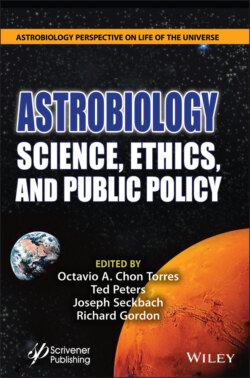Читать книгу Astrobiology - Группа авторов - Страница 30
2.2.3.2 From Space Sanctuary to Galactic Commons
ОглавлениеEarlier we introduced Arnould’s proposal to treat outer space as a sanctuary; and we introduced the Roman Catholic notion of the common good. In extending these ideas [2.66] we ask: Is it fitting to think of circumterrestrial space as a commons, as belonging to us all and not to any person or nation in particular? [2.62]. Boston University theologian John Hart would answer in the affirmative. “The sacred cosmic commons is a communion of commonses cosmically interrelated and integrated. It is stardust become spirit; it is atoms become life and thought, all in the presence of a transcendent-immanent Being-Becoming, creating Spirit” [2.33].
Let’s return for a moment to what the United Nations has said. “The exploration and use of outer space, including the moon and other celestial bodies, shall be carried out for the benefit and in the interests of all countries, irrespective of their degree of economic or scientific development, and shall be the province of all mankind” [2.85]. This has come to be known as the Common Heritage of Mankind Principle or CHP. The principle “confers on a region the designation of domino util or beneficial domain that should be legally defined as a res communis humanitatis, a common heritage that is not owned by any nation, but from which all nations may garner profits and benefits” [2.71]. Rather than national interests, the UN works with planetary interests. What about the interests of extraterrestrials?
Hart lifts up for us the ethical norm of a cosmic commons which takes into account the interest of the extraterrestrials.
“The cosmic commons is the spatial and local context of interactions among corporeal members of integral being who are striving to meet their material, spiritual, social, and aesthetic needs, and to satisfy their wants….The cosmic commons includes the aggregate of goods which, beyond their intrinsic value, have instrumental value in universe dynamics or as providers for the well-being of biotic existence. In the cosmic commons, goods that will eventually be accessible on the moon, asteroids, meteors, or other planets should prove useful to humankind, to other intelligent life, and to biokind collectively” [2.32].
Might Hart’s notion of a cosmic commons help us move forward from quandary to responsibility? Yes.
Perhaps some elements of the Roman Catholic concept of the “common good” could bleed over into our concept of the cosmic commons. “The common good as sum of the goods possessed by many and directed toward the utility of individuals,” writes Sergio Bastianel, “will be the common reaching out to realize a way of living together that can be accurately called communion” [2.6]. Or, the common good “indicates an ultimate goal of society, its utopia, in such a way that the intermediate aims will be critically evaluated in their being conformed toward such an aim of communion” [2.6]. For the near future, the commons will be shared by all of us who live on planet Earth. Perhaps in the more distant future, after we will have encountered extraterrestrial life and incorporated that life into our commons, the community of moral discernment will broaden. In short, our ethical vision directs our gaze toward a future communion shared by earthlings and spacelings.
Hart is not alone in proffering the idea of a cosmic commons as an ethical category. Like Hart and Dick, Mark Lupisella at NASA’s Goddard Space Flight Center proposes a “cosmocentric ethic,” which he contends “may be helpful in sorting through issues regarding the moral considerability of primitive extraterrestrial life as well as other ethical issues that will confront humanity as we move into the solar system and beyond” [2.42].
Arnould uses the term “Greater Earth” to communicate the same basic notion, although perhaps more limited in space. “Greater Earth defines the area, the space territory that surrounds the Earth and where most future space activities could take place” [2.3]. The Greater Earth within our solar system would host economic activities and provide the sphere of terrestrial moral responsibility. What we see here is a growing convergence toward the vision of a cosmic commons—whether called “Greater Earth” or a “cosmocentric ethic”—that makes the entire human community on Earth responsible for ethical deliberation and includes in our sphere of moral responsibility everything in space we can influence.
My preferred term, as I’ve already indicated, is “galactic commons” or “galactic common good.”
